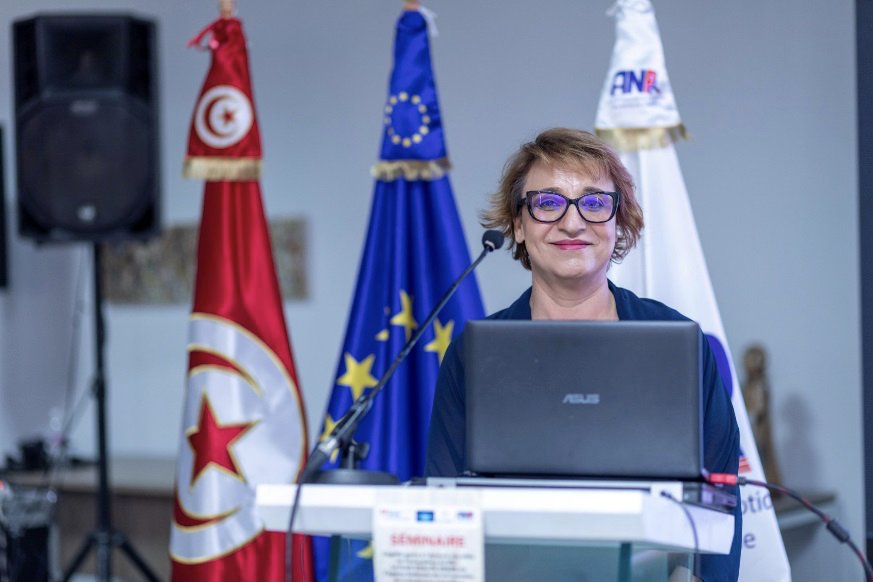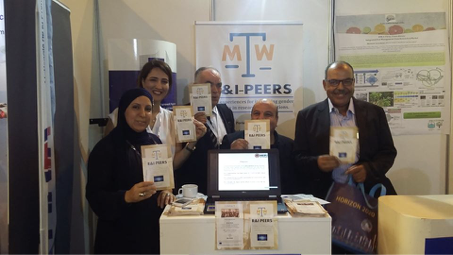R&I PEERS – ANPR Flagship Event: Gender equality facing the challenges of the R&I ecosystem – The GENDER EQUALITY PLAN of the National Agency for scientific Research Promotion
Through the ambitious R&I PEERS project, the National Agency for scientific Research Promotion (ANPR) in Tunisia, has succeeded in developing its Gender Equality Plan (GEP), which respects the Guidelines proposed by the European Institute for Gender Equality (EIGE) and adheres to the European Commission format. This document has been externally reviewed by members of an International Advisory Board, appointed by the European Commission.
To share this achievement with the stakeholders of the R&I ecosystem, ANPR organized a flagship event in the form of a seminar entitled “Gender equality facing the challenges of the R&I ecosystem: The GENDER EQUALITY PLAN of the National Agency for scientific Research Promotion”, on June 30, 2022, at the cultural space of the Ministry of Higher Education and Scientific Research (MHESR). The opening of the seminar and the welcome address were jointly provided by Prof. Chedly ABDELLY, the Director General of ANPR and Prof. Francesca ROMANA D’AMBROSIO, representing the University of Salerno, the coordinator of R&I PEERS project.
The first session on “Cross-experiences on the Gender approach in R&I”, was an opportunity to shed light on the flagship experiences, in terms of the gender approach, maintained within the Ministry of Higher Education and Scientific Research and its institutions. For that, a first framing presentation on “The integration of the Gender approach in the public policies of the Ministry of Higher Education and Scientific Research” was provided by Mrs. Habiba TALBI, the Director General of the Budget Management by Objectives Unit and the Representative of the Ministry on the Interministerial Council of Peers.
Immediately afterwards, a specific presentation on “The ANPR’s Gender Equality Plan: genesis and perspectives” was shared with the public present by Mrs. Amani MAHJOUBI CHARRAD, the coordinator of the R&I PEERS project at the ANPR level. This was an opportunity for the public to discover the details of the first GEP developed by a public administration in Tunisia.
The transition was with a presentation on “The Gender Cell of the University of Sousse: motivations and aspirations”, the first and only Tunisian University having structured the gender dimension. This inspiring presentation was provided by Mrs. Insaf BEKIR, founding member of the Gender cell and the Director of IHEC of Sousse (University of Sousse).
A conceptual and illustrated review of “Gender and Limiting Beliefs” was provided by Dr. Hafsi BEDHIOUFI, HDR Lecturer in Sociology, from the University of La Manouba. The first session was closed with a presentation on “Women and the Environment”, given by Mrs. Farah MNEKBI from the Center for Research, Studies, Documentation and Information on Women (CREDIF).
At the end of these presentations, a debate was triggered between speakers and participants focusing on the contours, the state of the art and the achievements of the gender dimension within the Ministry of Higher Education and Scientific Research and its institutions.
The second major part of the seminar was dedicated to the second session, that the objective is to promote networking between the representative actors of the R&I ecosystem in order to fertilize their respective experiences on the gender approach and this, to evolve “ Towards a pooling of efforts for an anchoring of the Gender approach”.
The very first intervention in this context, focused on the policy level “The Gender Approach: The national strategy of the Ministry of Family, Women, Children and the Elderly” and was provided by Ms. Akila BENTAIB, in her capacity as Director of Women’s Affairs.
Ms. Boutheina HAMMAMI, Program Coordinator at UN Women, ensured the transition, from the point of view of an international organization, to paint the panorama “The strategic axes of UN Women in Tunisia”.
A representative of the Arab Women’s Center for Training and Research (CAWTAR) was scheduled to speak on “Gender mainstreaming in economic research: the GERPA experience”, but for health reasons linked to the CORONA virus, Dr. Souleima MAJLEDI MANSOURI, Sociologist – Project Coordinator, could not ensure her intervention. From the perspective of the German Agency for International Development Cooperation (GIZ), Mrs. Rihab BEN YAGHLANE, Technical Expert of the Project “Support for Accelerated Tunisian Energy Transition-GIZ”, provided an intervention on “Gender & Energy – Multi-sectoral approach ».
As a last presentation, Pr. Habiba CHAABOUNI, Member of the Tunisian Academy of Sciences, Letters and Arts -Beit Al Hikma, concluded with an intervention that opens up perspectives on how “Building a career in research for women “
These presentations were crowned by a debate on development paths, with and for R&I actors, having gender sensitivity as a common denominator. This debate has put into perspective, a collective intelligence for potential synergies and new initiatives in this area. Indeed, a range of strategic and operational recommendations were noted, such as the establishment of a working group and inter-institutional gender monitoring unit, working on advocacy with decision-makers, setting up collaborative projects on gender (Horizon Europe and others).
In addition, the Ministry of Family, Women, Children and the Elderly is committed to bringing together stakeholders to maintain this excitement and perpetuate this dynamic around the gender approach.
On the sidelines of this flagship event, a tribute was awarded to talented and shining Tunisian Researchers Women, distinguished by their research work: Prof. Faouzia CHARFI (Senior Researcher) and Dr. Hasna Ellouzi (Early Stage Researcher), each received a Statue of a woman, made by the pottery of Sajnane. Note that Sajnane pottery is recognized by UNESCO as an intangible cultural heritage of humanity. These prizes have a symbolic value and convey messages of inclusion, solidarity and complicity between both researchers and rural women.
The seminar was closed on a high note by both Ms. Francesca MALAGUTI, the Gender Focal Point at the Delegation of the European Union in Tunisia and Dr. Helmi MARDASSI, the Director General of the Management Unit for European R&I Programmes who recalled that the GEP is a prerequisite to participate in the Horizon Europe Programme.
In conclusion, the embroidery of the ANPR’s Gender Equality Plan, which remains a perfectible, evolving and dynamic document, is an inspiring pilot experience able to constitute a strength of proposal and/or influence of the public policies of the Ministry of Higher Education and Scientific Research, the structures under its supervision and other stakeholders’ institutions, far beyond!












